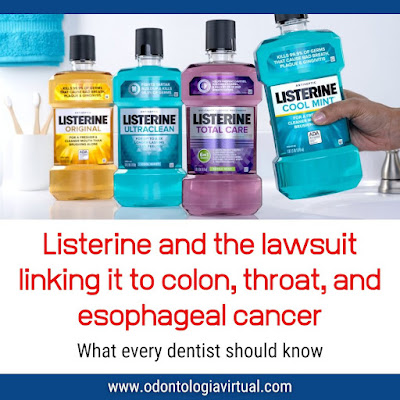hola@ovidentalgo.com
Recently, Listerine, the mouthwash manufactured by Johnson & Johnson, has been at the center of controversy following a lawsuit in the U.S. linking it to a possible risk of throat and colon cancer.
This has raised concerns among dental professionals and consumers alike. But what does the science say?
Why Was Listerine Sued?
In November 2024, a class-action lawsuit was filed in California against Johnson & Johnson, alleging that long-term and excessive use of Listerine could alter oral microbiota, favoring the growth of bacteria linked to certain cancers.
The plaintiffs cite studies showing that frequent use of Listerine increases the presence of opportunistic bacteria, including:
🔹 Fusobacterium nucleatum – Associated with colorectal cancer.
🔹 Streptococcus anginosus – Linked to throat and esophageal cancer.
Is It True That Listerine Can Cause Cancer?
Despite the lawsuit and studies suggesting a possible impact on oral microbiota, there is no conclusive evidence proving that Listerine alone causes cancer.
Johnson & Johnson has strongly denied any connection, stating that their product is safe when used properly.
Johnson & Johnson’s Statement
"Listerine has been tested in multiple peer-reviewed studies over the past century, supporting its safety when used as directed."
How Should Dentists Advise Patients on Mouthwash Use?
As dentists, we must guide our patients on how to properly use mouthwash to maximize benefits and minimize risks:
✔ It does not replace brushing and flossing.
✔ Avoid prolonged use without professional guidance.
✔ Opt for alcohol-free mouthwashes for patients with dry mouth or oral sensitivity.
✔ Check the ingredients and use chlorhexidine-based mouthwashes only when necessary.
Conclusion
Listerine use has not been scientifically proven to cause cancer, but excessive use could alter the oral microbiome and increase the presence of opportunistic bacteria.
As professionals, we must educate our patients on its proper use and recommend alternatives when necessary.













